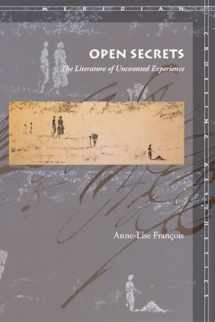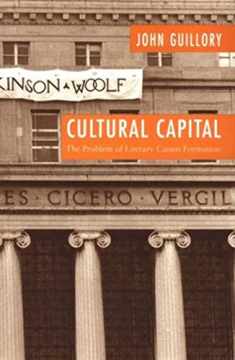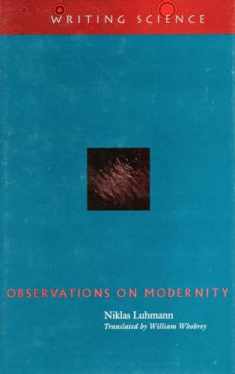
Open Secrets: The Literature of Uncounted Experience (Meridian: Crossing Aesthetics)
ISBN-13:
9780804752893
ISBN-10:
0804752893
Edition:
1
Author:
Anne-Lise François
Publication date:
2007
Publisher:
Stanford University Press
Format:
Paperback
322 pages
FREE US shipping
Book details
ISBN-13:
9780804752893
ISBN-10:
0804752893
Edition:
1
Author:
Anne-Lise François
Publication date:
2007
Publisher:
Stanford University Press
Format:
Paperback
322 pages
Summary
Open Secrets: The Literature of Uncounted Experience (Meridian: Crossing Aesthetics) (ISBN-13: 9780804752893 and ISBN-10: 0804752893), written by authors
Anne-Lise François, was published by Stanford University Press in 2007.
With an overall rating of 3.8 stars, it's a notable title among other
books. You can easily purchase or rent Open Secrets: The Literature of Uncounted Experience (Meridian: Crossing Aesthetics) (Paperback) from BooksRun,
along with many other new and used
books
and textbooks.
And, if you're looking to sell your copy, our current buyback offer is $0.62.
Description
Open Secrets identifies an ethos of affirmative reticence and recessive action in Mme de Lafayette's La Princesse de Clèves (1678), Jane Austen's Mansfield Park (1814), and poems by William Wordsworth, Emily Dickinson, and Thomas Hardy. The author argues that these works locate fulfillment not in narrative fruition, but in grace understood both as a simplicity of formal means and a freedom from work, in particular that of self-concealment and self-presentation. Declining the twin pressures of self-actualization and self-denial defining modernity's call to make good on one's talents, the subjects of the "literature of uncounted experience" do nothing so heroic as renounce ambitions of self-expression; they simply set aside the fantasy of the all-responsible subject. The originality of Open Secrets is thus to imagine the non-instrumental without casting it as a heavy ethical burden. Non-appropriation emerges not as what is difficult to do but as the path of least resistance. The book offers a valuable counterpoint to recent anti-Enlightenment revaluations of passivity that have made non-mastery and non-appropriation the fundamental task of the ethical subject.


We would LOVE it if you could help us and other readers by reviewing the book
Book review

Congratulations! We have received your book review.
{user}
{createdAt}
by {truncated_author}




